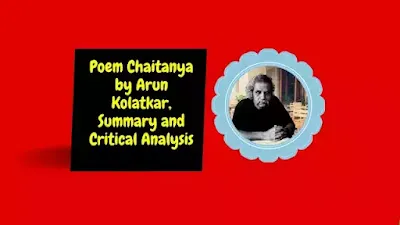Introduction of the Poem:
Chaitanya was a Vaishanvite Bengali saint and reformer. He is said to have visited Jejuri in 1510-11. There are three poems entitled Chaitanya in Jejuri. “Chaitanya” also means energy which, perhaps, here refers to the creative spirit of man.

Summary of the Poem:
Chaitanya is an evidence of the pilgrim's faith that Jejuri is really a sacred place and that the temple of Khandoba here is genuine. They believe that every stone lying round the temple is as sweet as a grape, as Chaitanya said when he visited this temple in the early sixteenth century; every stone is as holy as god. Chaitanya dropped such a stone in his mouth and when he took it out, the stone produced many gods. This testifies to the sacredness of the place.
This short poem is a satire on the blind faith of the pilgrims visiting the Khandoba temple at Jejuri. Every stone here is considered sacred and sanctified by Chaitanya. The reference to the Bengali saint is ironically used to cement the faith of pilgrims.
Critical Analysis of the Poem:
Kolatkar has written this short poem as evidence of a pilgrim's faith that Jejuri is really a sacred place and that the temple there is a genuine temple dedicated to Khandoba. In fact, the pilgrims to Jejuri believe that every stone lying around the temple is as holy as a god, and that every stone there can produce not one god but many of them.
This short poem is a satire on the blind faith of the Maharashtrians in the legend relating to the temple of god Khandoba. The Maharashtrians genuinely believe that the temple at Jejuri, with its stone and bronze images and statues of not only Khandoba but of several other deities, is a holy place where worship must be offered. According to Chaitanya, the stones at Jejuri are sweet like grapes. But, when we eat grapes, we keep throwing out from our mouths the seeds which are not edible. In the case of Jejuri, even if a pilgrim puts a stone into his mouth, what he would throw out would not be any seeds but gods. In other words, every stone at Jejuri has the makings of a large number of gods. Kolatkar has used the weapon of irony to ridicule the blind faith of the Maharashtrians who visit Jejuri. The idea in this poem has been attributed to a saint by the name of Chaitanya in order that the idea may appear to be authoritative and, therefore, credible and valid. Actually the name of Chaitanya, used here to support and strengthen the idea, deepens the irony. Here we have one of the most amusing poems in the whole sequence. And the brevity and compactness of the poem and the condensation of the material of the poem are remarkable. The whole poem reads like an epigram.






